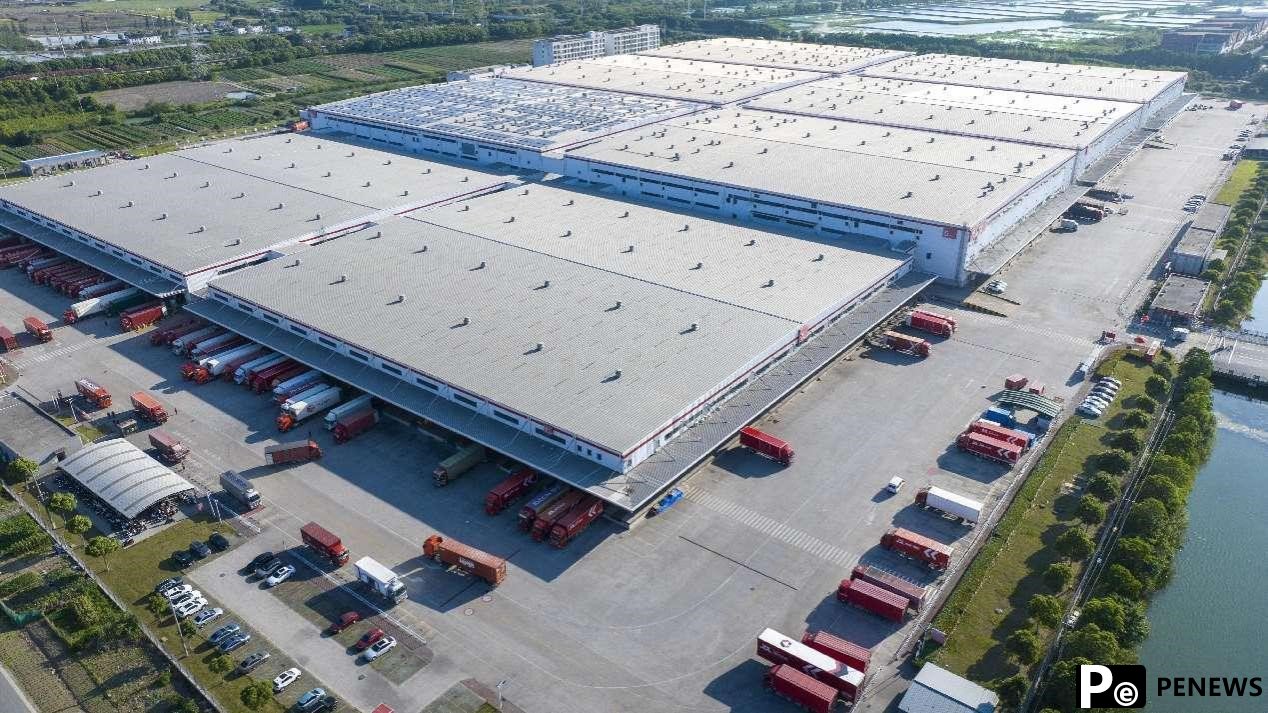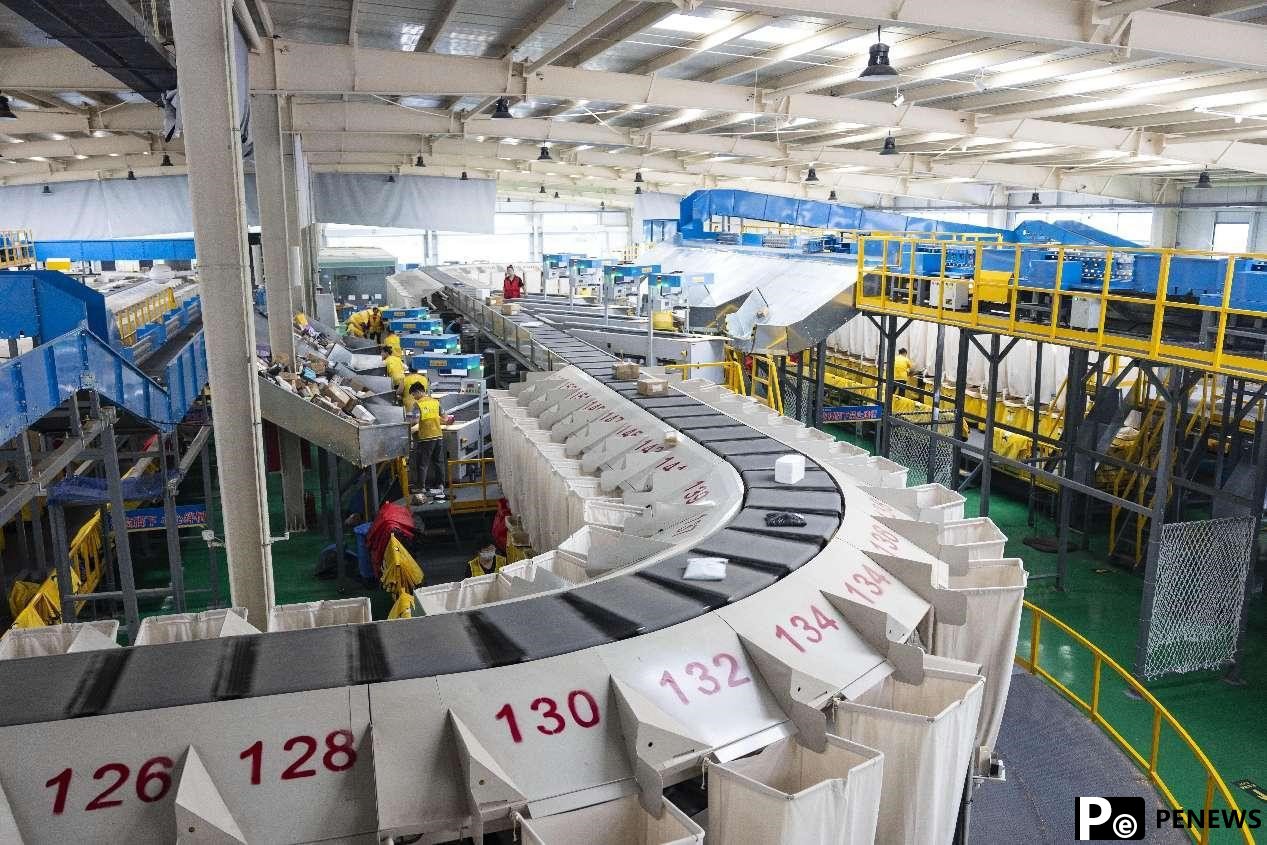Home>>
80.16 bln parcels: China's express delivery sector runs faster in H1 2024By Han Xin (People's Daily) 14:41, July 22, 2024

Package delivery trucks wait to be loaded or unloaded in the Kunshan Asia No. 1 Intelligent Logistics Park of Chinese online retailer JD.com, east China's Jiangsu province. (People's Daily Online/Yuan Xinyu)
China's courier sector handled a record number of 80.16 billion parcels during the first six months of 2024, representing a 23.1 percent growth compared to the same period last year, according to data from the country's State Post Bureau.
The burgeoning courier sector mirrors China's dynamic development. With efficient logistics services connecting China with the rest of the world, the country has continued to improve its modern distribution system to bolster the vibrancy and resilience of its economic growth.
As China's economy maintains steady progress, there has been a robust increase in consumer demand, said Wang Yuehan, a researcher with the Development and Research Center of China's State Post Bureau.
"Thanks to favorable policies to expand domestic demand and stabilize economic growth, China's courier sector has achieved sound progress since the beginning of this year, contributing to the development of the digital economy and more efficient allocation of products and factors," Wang said.
In the first half of this year, China's express delivery market has demonstrated strong vitality, with the highest daily express delivery volume exceeding 580 million pieces.
The rapid growth has driven the sector's operating revenue to grow by 15.1 percent year on year to 653 billion yuan ($89.83 billion).
China's courier sector has gained momentum in rural areas with wider service accessibility.
"In the first half of this year, China has been improving its rural logistics system and enhancing the quality of delivery services in rural areas, bringing more rural agricultural products to urban areas and contributing to comprehensive rural revitalization," said Wang.
Given that Luntai township, Luntai county, northwest China's Xinjiang Uygur autonomous region, is now in the peak season for marketing small white apricots, ZTO Express, a major express delivery company in China, has launched a new air express service to transport these freshly picked fruits to customers in cities like Beijing, Shanghai, and Guangzhou, with delivery as early as the next day.
The fast delivery can be attributed to the company's extensive service network. As of June this year, ZTO Express had expanded its logistics service network to over 176,000 administrative villages across China, an 11.1 percent increase year on year.

Staff members scan bar codes on the outer packing of parcels to sort them at a distribution center of Cainiao Network, the logistics arm of Chinese e-commerce giant Alibaba Group, in Guangrao county, Dongying city, east China's Shandong province. (People's Daily Online/Liu Yunjie)
Besides, China has rapidly expanded its global logistics services.
Solid strides have been made in developing international logistics hubs. In the first six months of this year, China has made steady progress in building its five international postal and express service hub clusters.
Many regions have also started using or improving overseas warehouses, while the number and size of overseas warehouses run by Chinese companies have been on a steady rise, which all demonstrates the initial results in developing an international logistics hub system.
In the meantime, the country has intensified efforts to build a multidimensional logistics service network for companies seeking a stronger presence in overseas markets.
During the first half of this year, thanks to the continuous enhancement of different cross-border transportation modes, the country has seen a consistent improvement in its international transportation capacity.
For instance, the country's courier companies are rapidly expanding their all-cargo aircraft fleet, with over 40 international routes already in service.
The transportation of parcels has been facilitated by China-Europe freight trains, and a special freight train service between China and Russia has been launched.
Moreover, shipping routes have been established, connecting Chinese ports to those on the west coast of the United States.
Cross-border service capabilities of Chinese express service providers have been further improved during this period.
For example, Cainiao Network, the logistics arm of Chinese e-commerce giant Alibaba Group, has set up a dedicated warehouse for the UEFA European Championship (UEFA Euro) to handle parcels from European consumers, allowing for orders made in the morning to be shipped out as early as the same afternoon.










